The National Audit Office (NAO) has published its report into school finances today. Schools Week has the key findings:
(You can read our news story here)
1. Schools will have to cut £3 BILLION to meet cost pressures at worst level ‘since mid-1990s’
The NAO highlights that school budgets are being squeezed by pay rises, the national living wage, higher employer contributions to national insurance and pensions, and the apprenticeship levy.
Headteachers have been raising this issue, and the cost-cutting implication, for ages using #flatcash on Twitter (read more here).
The NAO said schools now face having to find savings of £3 billion by 2019-20, equating to an 8 per cent real-terms reduction in funding – the worst since the mid-1990s.
The report suggests the DfE doesn’t have a clear idea of how these savings will be made, nor has it clearly communicated to schools the “scale and pace” of cost-cutting required. However it looks like most the cash will be recouped from the workforce.
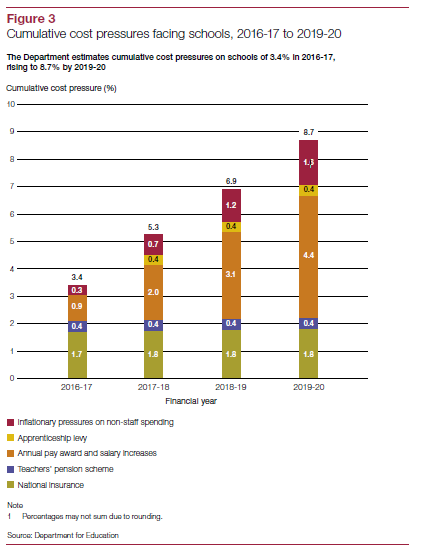
2. More secondary schools are over-spending, with deficits growing
The proportion of local-authority maintained secondary schools spending more than their annual income increased from just over a third in 2011, to nearly 60 per cent last year.
While the number of secondaries in deficit remained static, the average deficit increased from £246,000 to £326,000.
And the financially-troubled schools appear to be clustered in a handful of authorities: one third of the schools in deficit last year were in just 13 local authorities.
For academies, an increasing number of trusts are spending more than they earn (table below). Over-spending primaries rose from nearly a third in 2013, to 44.1 per cent last year. For secondaries that rise was even sharper, from 38.8 per cent to 60.6 per cent.
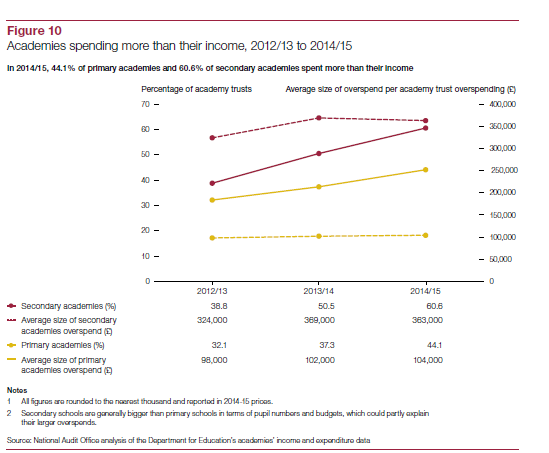
3. Meanwhile the rich schools get richer by stockpiling cash reserves
It’s not bleak for all schools.
The percentage of maintained schools with surpluses worth 15 per cent of more of their annual income increased from 4.7 per cent in 2011, to 11.6 per cent last year.
The report read: “Stakeholders told us this may be due to uncertainty over future funding with schools seeking to build up a contingency in case of funding cuts.”
For academies, the number of single academy trusts with a surplus worth 15 per cent or more rose from a quarter in 2012, to nearly 40 per cent last year.
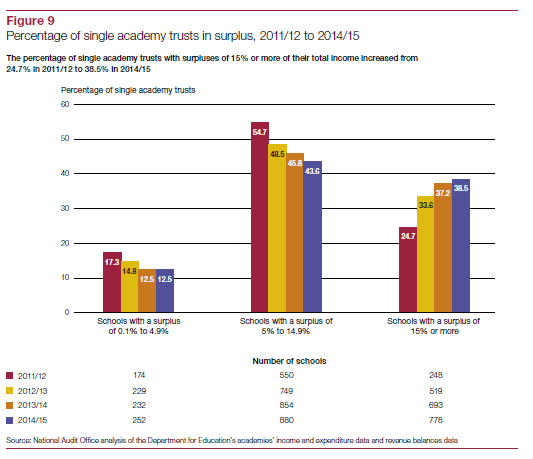
4. Schools are slashing their staff costs
As previously reported by Schools Week, schools are now at the point where they have cut all they can from non-staff budgets – all that remains are savings from staff costs.
Maintained schools now spend 51 per cent of their total expenditure on teaching staff, down from 56 per cent in 2011, the report found.
For academies, the spend fell from 55 per cent in 2012, to 52 per cent last year.
Headteachers told the NAO they did so by replacing higher-paid teachers with younger recruits, using interim staff and relying more on unqualified staff.
Interestingly, the NAO also found schools without budget reductions are cutting staff. When investigating a sample of schools, seven in 10 had cut per-pupil spending on teaching staff – despite only a third having a drop in funding.
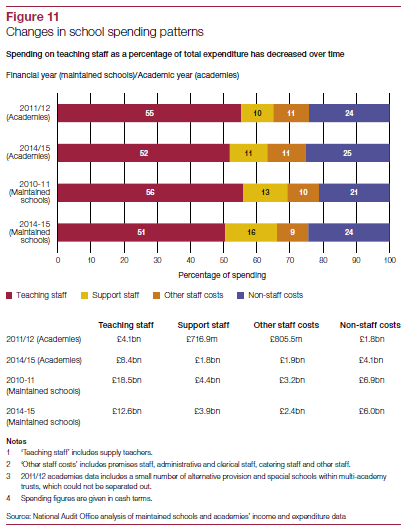
5. Small secondary schools are more vulnerable than small primaries
A total of 21 per cent of maintained secondaries with fewer than 630 pupils were in deficit last year, compared to just 9 per cent of those with more than 1,178 pupils.
However there is less variation for primaries (see table below) with very small numbers in deficit.
University technical colleges (UTCs) also get a mention for struggling to recruit pupils. Between February 2014, and October this year, the EFA assessed 22 UTCs at risk due to financial problems, the NAO said. Schools Week has covered the problems faced by UTCs in depth – read the most recent update here.
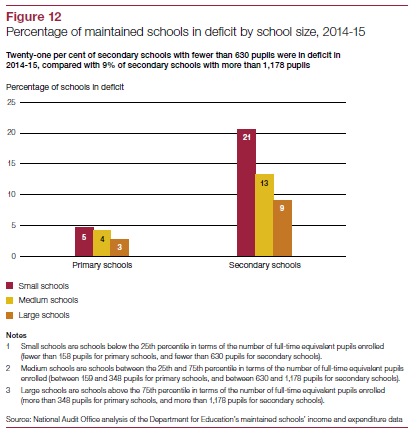
6. Government crack team being assembled to help schools – but it’s taking too long
The department is developing a workforce strategy to help schools achieve savings without compromising educational outcomes.
New products and guidance, such as training in curriculum-based planning, will be available – but not until 2017.
The NAO said delay in providing support “increases the risk schools will make poorly informed decision that could have a detrimental effects on educational outcomes”.
7. ‘Invest to save fund’ to be launched

The report reveals the department is working on a cash pot to help schools drive efficiencies in the medium- to long-term, however this has been delayed along with the national funding formula.
The NAO said the department has not yet decided when and how it will introduce the fund.
But schools already get some support for efficiencies. Schools Week has previously revealed how the government paid academies £8 million over three years to make staff redundant.
8. The department has been taking lessons from David Cameron’s famed ‘nudge unit’ to push savings
The department’s communications strategy is to promote awareness by “drip-feeding” information across working groups and professional networks. The NAO said the aim is to “nudge” schools to improve their financial health.
This follows the method employed by the behavioural insights unit, used by David Cameron’s government to bring about desired outcomes by nudging people to make different choices. (More of that in schools, here)
The DfE’s priority is to communicate with the “hardest-to-reach” schools, but it can not yet identify all schools at risk. The NAO concluded it’s “not clear how the department ensures that schools most in need of advice receive and use it”.
9. One in four trusts put back on financial concern list after EFA intervention

The government’s current system of intervention in academies – such as issuing financial notices to improve – has not been “systematically evaluated” to assess whether it helps long-term financial sustainability.
When the NAO did investigate, they found 70 out of 322 trusts that were flagged up as national concerns ended up back on the concern list, despite receiving Education Funding Agency (EFA) intervention.
A total of 39 of these fell back into trouble for the same reasons. The report read: “Interventions may not always result in trusts successfully addressing the financial issues.”
The EFA is now developing a new system which it hopes will pick up trusts before they fall into difficulty, so preventative support can be provided.
The new tool will use projections for up to five years. It will be piloted in January, and rolled out in March next year.
10. Councils to come under closer EFA scrutiny
The EFA stepped in to investigate councils following finance concerns at their schools just 13 times last year (one council over deficits, 11 over surpluses).
But the government has changed its intervention thresholds after the NAO highlighted constraints with the current model.
It will now use an intervention tool suggested by the NAO for next year. If that model was used this year the EFA would have intervened in 30 councils, rather than 12 – meaning councils are facing more scrutiny.
11. EFA record keeping is rubbish
The NAO had difficulties with the EFA’s central records. In a third of cases where trusts had a deficit of more than five per cent of their income last year, they were not included on the national concern register and records did not explain why.
The NAO had to investigate cases individually and found, in some instances, after contacting the trust the EFA data was incorrect, or a recovery plan was already in place.
The department said it introduced a new central system in October last year and will “continue to work to improve records in the future”.


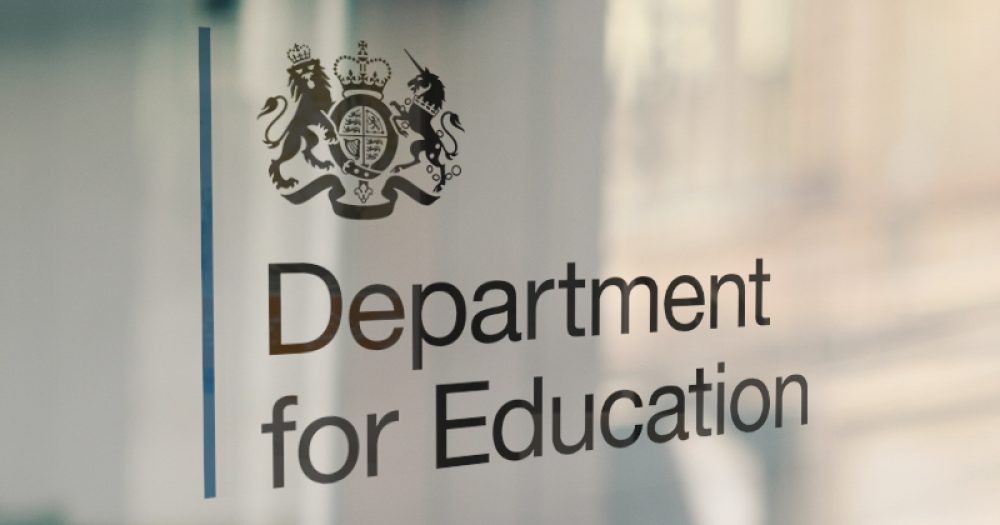





Your thoughts